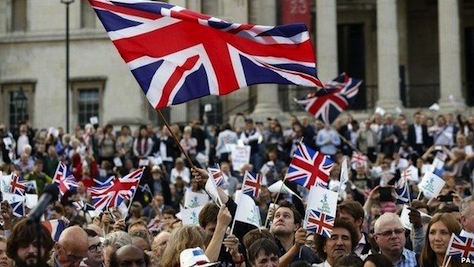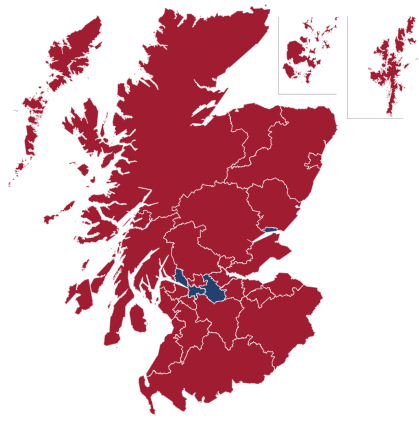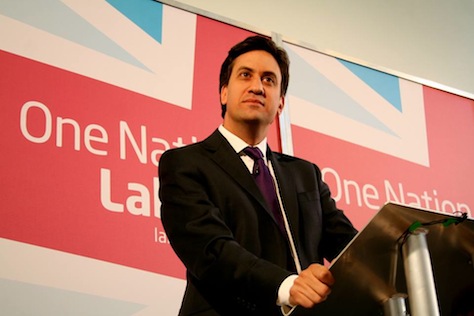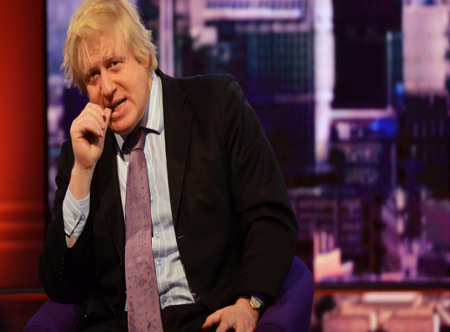
The United Kingdom is closer to May 2015 than it is to May 2010, which is to say that it’s closer to the next general election than to the previous one.
With the announcement of the 2013 budget coming later this month, likely to be very controversial if it features, as expected, ever more aggressive expenditure cuts, what does UK prime minister David Cameron have to show for his government’s efforts?
The prevailing conventional wisdom today is that Cameron and his chancellor of the exchequer George Osborne (pictured above) have pushed blindly forward with budget cuts at the sake of economic growth by reducing government expenditures at a time when the global economic slump — and an even deeper economic malaise on continental Europe — have left the UK economy battered. If you look at British GDP growth during the Cameron years (see below — the Labour government years are red, the Cameron years blue), it’s hard to deny that it’s sputtering:
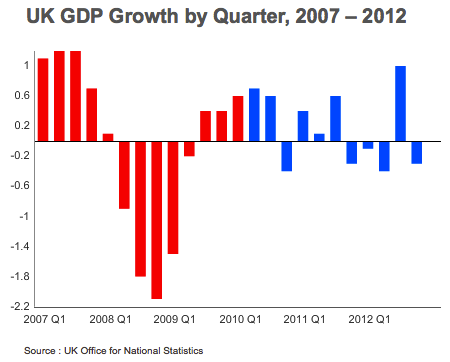
One way to look at the chart above is that following the 2008 global financial panic, the United Kingdom was recovering just fine under the leadership of Labour prime minister Gordon Brown, and that the election of the Tory-led coalition and its resulting budget cuts have taken the steam out of what was a modest, if steady, economic recovery. Those cuts have hastened further financial insecurity in the United Kingdom, critics charge, and you need look no further than Moody’s downgrade of the UK’s credit rating last month from from ‘AAA’ to ‘AA+’ for the first time since 1978.
An equally compelling response is that British revenues were always bound to fall, given the outsized effect of banking profits on the UK economy, and that meant that expenditure corrections were inevitable in order to bring the budget out from double-digit deficit. In any event, 13 years of Labour government left the budget with plenty of fat to trim from welfare spending. Despite the downgraded credit rating, the 10-year British debt features a relatively low yield of around 2% (a little lower than France’s and a bit higher than Germany’s), and we talk about the United Kingdom in the same way we talk about the Netherlands, Belgium and Germany — not the way we talk about Iceland, Ireland, Spain, Italy or Greece. Given the large role the finance plays in the British economy, it wasn’t preordained that the United Kingdom would be more like France than, say, Ireland.
Nonetheless, polls show Cameron’s Conservative Party well behind the Labour Party in advance of the next election by around 10%, making Labour under the leadership of Ed Miliband and shadow chancellor Ed Balls, a Brown protégé, implausibly more popular than at any time since before former prime minister Tony Blair’s popularity tanked over the Iraq war. Despite Cameron’s ‘modernization’ campaign, which notched its first notable triumph with the recognition of same-sex marriage in February, over the howls of some of his more old-fashioned Tory colleagues, he remains deeply unpopular.
Meanwhile, the upstart and nakedly anti-Europe United Kingdom Independence Party — Cameron famously once called them a bunch of ‘fruitcases, loonies and closet racists’ — has grown to the point that it now outpolls Cameron’s governing coalition partners, the Liberal Democratic Party. UKIP even edged out the Tories in a recent by-election in Eastleigh, and Cameron has relented to calls for the first-ever referendum on the continued UK membership in the European Union (though, targeted as it is for 2017, it assumes that Cameron will actually be in power after the next election).
Nervous Tory backbenchers, already wary of local elections in May and European elections in 2014, are already starting to sound the alarms of a leadership challenge against Cameron, though it’s nothing (yet) like the kind of constant embattlement that plagued former Labour prime minister Gordon Brown.
Former Conservative prime minister Margaret Thatcher faced an even more dire midterm slump in the early 1980s and still managed to win the 1983 general election handily, but if the current Labour lead settles or even widens, political gravity could well paralyze the government in 2013 and 2014 in the same way as Brown’s last years in government or former Tory prime minister John Major’s.
It’s worth pausing to note what the Cameron-led coalition government has and has not done.
Continue reading Should David Cameron change course over the UK budget? →
![]()
![]()
